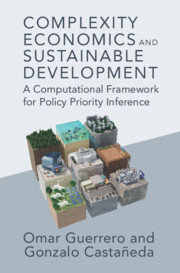 Complexity Economics and Sustainable Development
Complexity Economics and Sustainable Development Book contents
- Frontmatter
- Dedication
- Contents
- Figures
- Tables
- Foreword
- Acknowledgments
- Abbreviations
- Part I A Complexity Approach to Sustainable Development
- 1 Introduction
- 2 Policy Prioritisation, Complexity, and Agent Computing
- 3 Relevant Data and Empirical Challenges
- 4 A Computational Model
- 5 Calibration and Validation
- Part II A Global View of Sustainable Development
- Part III A Focalised View of Sustainable Development
- Bibliography
- Index
3 - Relevant Data and Empirical Challenges
from Part I - A Complexity Approach to Sustainable Development
Published online by Cambridge University Press: 04 January 2024
- Frontmatter
- Dedication
- Contents
- Figures
- Tables
- Foreword
- Acknowledgments
- Abbreviations
- Part I A Complexity Approach to Sustainable Development
- 1 Introduction
- 2 Policy Prioritisation, Complexity, and Agent Computing
- 3 Relevant Data and Empirical Challenges
- 4 A Computational Model
- 5 Calibration and Validation
- Part II A Global View of Sustainable Development
- Part III A Focalised View of Sustainable Development
- Bibliography
- Index
Summary
This chapter introduces the reader to the public datasets that we employ in most of the applications developed in the book. This information is our main input to provide a worldwide view of the state of sustainable development and how it responds to government expenditure. In light of this global database on development indicators, we also describe the most popular analytic tools and their limitations. Finally, we reflect on the main empirical challenges that researchers face when studying sustainable development with these data and motivate the methodological proposal of the book.
Keywords
Information
- Type
- Chapter
- Information
- Complexity Economics and Sustainable DevelopmentA Computational Framework for Policy Priority Inference, pp. 53 - 103Publisher: Cambridge University PressPrint publication year: 2024
- Creative Commons
- This content is Open Access and distributed under the terms of the Creative Commons Attribution licence CC-BY-NC 4.0 https://creativecommons.org/cclicenses/